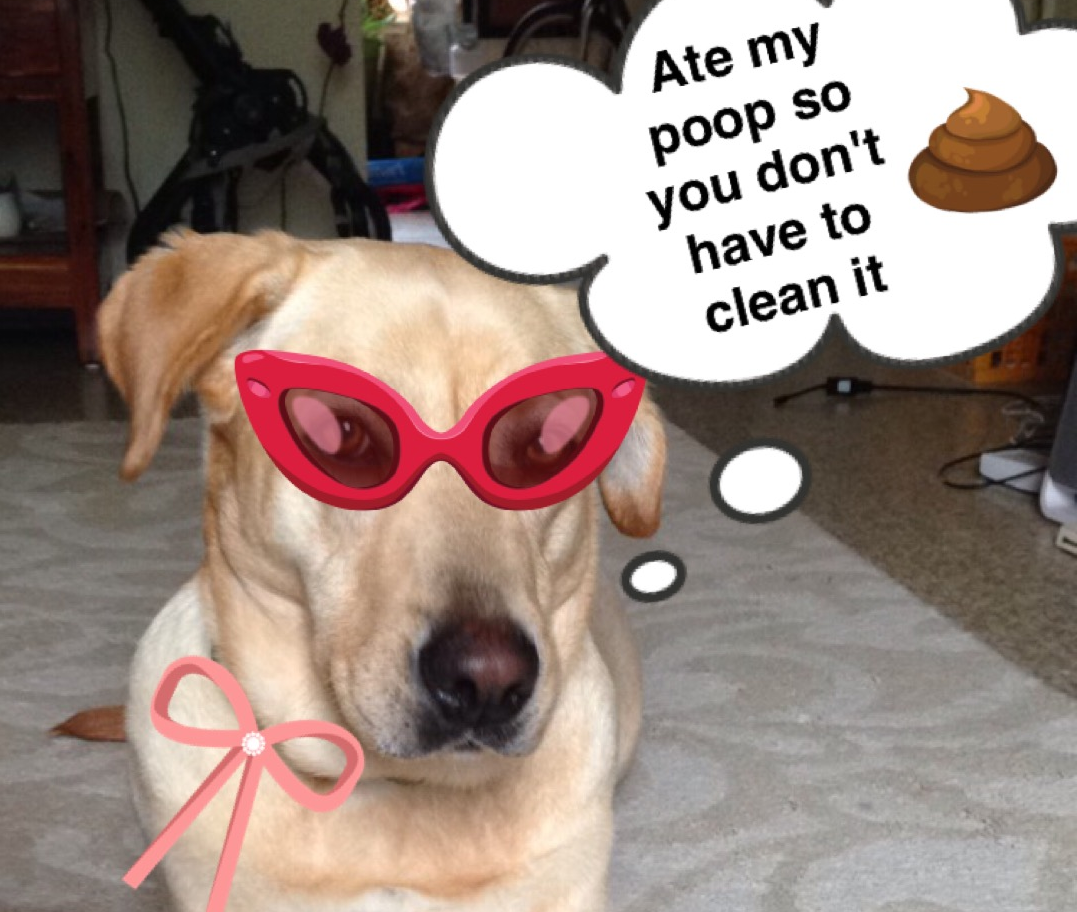WHY DO DOGS EAT POOP?
An estimated 16% of domesticated dogs eat poop1. According to Merriam-Webster the medical definition of this behavior is “the eating of feces that is normal behavior among many animals” and it is known as “coprophagia”. So, nearly a fifth of all dogs eat poop and our good folks in the dictionary realm say this is normal behavior. Why, then, do so many people get grossed out by their dog’s trip to the cat’s litter box or the self-cleaning dog who “eats [her] poop so you don’t have to clean it”?
DISCLAIMER: While I am focusing on the ways coprophagia can be normal, there are certain conditions in which this behavior is related to serious deficiencies2. However, these are often severe situations, seldom seen in most households2.
Now that ye have been warned, I shall proceed. Many dog owners have witnessed in disgust dogs partaking in the “forbidden fruit” - poop. But, why? Chimps and bunnies do it3, so why not dogs, maybe? Are they simply doing as the wild animals do?
If we move our attention to the wild counterparts of the domestic dog, we will find evidence of coprophagia there as well. Wild canids have been shown to preserve their territory with this poop-eating behavior4. How does poop eating lead to keeping encroachers off one’s territory? Sneaky canines trot through other wild dogs’ marked areas, dropping their own markings along the way (that would be the poop). However, the owners of said territory sleuth out these poop markings in order to reclaim their land. They will eat the feces of the invader pups and replace it with their own4. However, domesticated dogs don’t really have a defined territory like the ones seen for wild canids; therefore, this probably isn’t the best explanation. Nevertheless, it is possible this behavior is an evolutionary leftover in domestic dogs from their wild ancestors.
There is one other studied instance in which the dog’s wild counterparts will consume feces. This is when a tidy momma dog protects her babies1 from parasites5. Say what? Where did parasites come into this picture, and how is eating poop protecting anyone? Mother dogs will eat their young’s poop in order to prevent them from getting infected by parasites that thrive1 in the poop5. When the puppies are too young to move around very much, they are at risk of infection because they cannot get away from the area in which they poop. Thus, they could ingest the parasites if the poop is left around. In comes supermom-dog. Dutiful momma dog will eat the pup’s feces before the parasites infest them and she will lick their bottoms to keep them clean and tidy; this behavior is known as den sanitation behavior1. Now this is something witnessed in domesticated dogs, as well. Great, we figured it out! They are just being tidy. But… this doesn’t explain the habitual eating of feces. We must trudge on.
According to researchers, coprophagia could be a tool used to recuperate1 lost nutrients2. Dogs might not always digest food well enough to acquire the nutrients they need to perform their doggy duties of chasing the mail person or chasing balls, so they eat their own poop, as well as poop of other animals to supplement their diet. It’s kind of like a human taking vitamins. Indeed, it has been suggested canines consume ungulate - mainly herbivorous animals with hooves, like horses and hippos - feces for the antioxidant properties.
Apart from healthy dogs just trying to in-take their supplements, coprophagia can also manifest as an attention seeking behavior2. Humans to react and react quickly to a dog’s ingestion of less than savory (to us) “food” particles. This may lead to a dog partaking in the steamy treats in order to solicit attention from the owner. So in the words of a Chinese proverb, “A fool judges people by the presents they give him”. In the light of that statement, judge your dog not for his or her dirty mouth, but instead by the notion the dog just wants to spend more time with you.
On a more serious note, coprophagia can be the result of serious stress1 and anxiety2. This may result from harsh punishment, which has been suggested only makes the problem worse6. Punishing the “bad” behavior of poop-eating could worsen the problem by causing an association for the dog between pooping and punishment6. This could lead the dog to attempt consuming the feces more quickly in order to cover up what he or she views as the problem - the act of pooping. According to researcher surveys, pet owners try many methods to combat coprophagic behavior including adding tabasco sauce or chili powder to feces or euthanasia (sadness), which did little to cease the poop-eating (except in the case of euthanasia)3. This supports the idea that punishment might not be the way to go when attempting to curb a dog’s appetite for feces. What does help? Spending time with your dog. Boze (2008)6 found that the best treatment for coprophagia is an active owner-dog relationship. Examples of this include always taking your dog out on a leash and rewarding good behavior (i.e. pooping and not eating the droppings).
In conclusion, while there are rare instances in which coprophagia may indicate a disorder or deficiency, for the most part it is not a health hazard and may just be a vestige of dog ancestors eating poop to maintain territory. So, while you may not want to kiss your dog after a big meal of poop, you can still feel comfortable loving your dog knowing he or she is likely not in any danger.
REFERENCES
D. McKeown, A. Luescher, M. Machum, Coprophagia: Food for thought. Can. Vet. J.29, 849-850 (1988).
T.R. Livingston et al. Scat removal: a source of bias in feces-related studies. Wildlife Soc. B.33, 172–178 (2005).33%5B172:SRASOB%5D2.0.CO%3B2)
K. Houpt, Ingestive behavior problems of dogs and cats. Vet. Clin. N. Am.-Small.12, 683–692 (1982).

